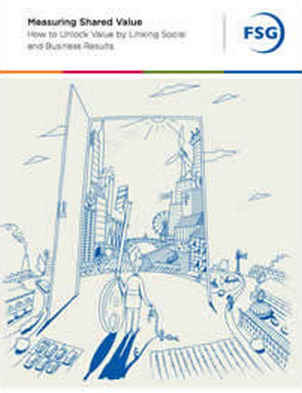The Promise of Measuring Shared Value: A New FSG Report reveals how companies can use measurement to unlock value
Editor’s note: This article was originally published in Business Fights Poverty and has been cross-posted here with permission.
Can something simultaneously be both a cliché and an emergent, nascent approach?
Consider corporate approaches to working with smallholder farmers. This is fairly mainstream thinking in international development. We hear these examples at every conference and in every report on agricultural development. Companies create shared value by helping improve yields of critical crops such as coffee, cocoa, or rice and at the same time improve farmer livelihoods. Examples abound of companies such as Nestlé, Starbucks and Cargill providing extension services, access to inputs, access to markets, improved supply chains, etc. Farmers sell more crops, increase their incomes, and improve their lot in life. So, there is no new news here, right?
Well, if we dig a little deeper, we learn that significant gaps exist to perfecting this approach. What’s missing?Measurement. Effective measurement is the missing link to unlocking additional value for companies and for farmers. Despite well-intentioned and well-executed efforts, companies are leaving significant value on the table because they do not have the analytical tools and approaches for measuring shared value.
In a new report, “Measuring Shared Value,” co-authored by Michael E. Porter and FSG, we illuminate how companies can use measurement to unlock additional value for their business and society. An outgrowth “Creating Shared Value” by Porter and Mark Kramer in Harvard Business Review, this report tackles the key shared value challenge we hear from companies all over the world – how to measure and improve shared value approaches.
Overall, what’s needed is for companies to execute and measure shared value approaches much like they do with mainstream business strategy and operations. Companies need to anchor measurement in an explicit shared value strategy with a forward-looking business case. Companies model what activities and investments are anticipated, how those activities will drive social results, how social results will link to business results, and what value is being created. Such an approach provides a roadmap for which social and business results to track as well as a platform for analyzing and identifying opportunities for continuous improvement, i.e., opportunities to unlock additional value.
Nestlé’s agricultural development work provides an example of measuring shared value in action – insights and data from measurement have helped identify where and how Nestlé’s agronomists should focus their time to optimize farmer yields, quality, and quantity. Around the world, Nestlé employs over 1,100 agricultural staff and works with an additional 10,600 support staff to train farmers, provide them with better technology, and assist farm communities in local development projects.
 Measuring shared value has allowed Nestlé to validate the link between farm improvements and increased supply of milk in India. For example, in Rajasthan, India, Nestlé has worked directly with more than 8,000 farmers. The company’s rural officers monitor progress through regular farm visits and they track specific indicators such as herd size and cattle health. Nestlé also measures the increased volume of milk it sources, which in this region has grown 13 percent per year since 2008. As Nestlé’s agronomists gain a deeper under-standing of the performance of individual farmers, they are able to better allocate their efforts to those farmers who have the most improvement potential and can therefore increase the shared value created.
Measuring shared value has allowed Nestlé to validate the link between farm improvements and increased supply of milk in India. For example, in Rajasthan, India, Nestlé has worked directly with more than 8,000 farmers. The company’s rural officers monitor progress through regular farm visits and they track specific indicators such as herd size and cattle health. Nestlé also measures the increased volume of milk it sources, which in this region has grown 13 percent per year since 2008. As Nestlé’s agronomists gain a deeper under-standing of the performance of individual farmers, they are able to better allocate their efforts to those farmers who have the most improvement potential and can therefore increase the shared value created.
Nestlé’s approach to measuring shared value, while still evolving, demonstrates how companies need to develop “new muscles” in executing effective share value strategies. If the world is going to reap the promise of shared value – sustainable, scalable approaches to solving social problems – then companies need to apply the same rigor to these efforts as they do in their mainstream business activities.
So, while corporate approaches to smallholder development are indeed a cliché in development circles, the nascence of measurement approaches portends significant opportunity for companies to further optimize results and drive more value creation. The promise of shared value measurement applies not only to agricultural development, but also to shared value strategies in education, health care, environment, and community development. We look forward to further dialogue on this topic as companies incorporate and refine measuring shared value approaches around the world.
Greg Hills and Marc Pfitzer are managing directors at FSG.
- Categories
- Impact Assessment
